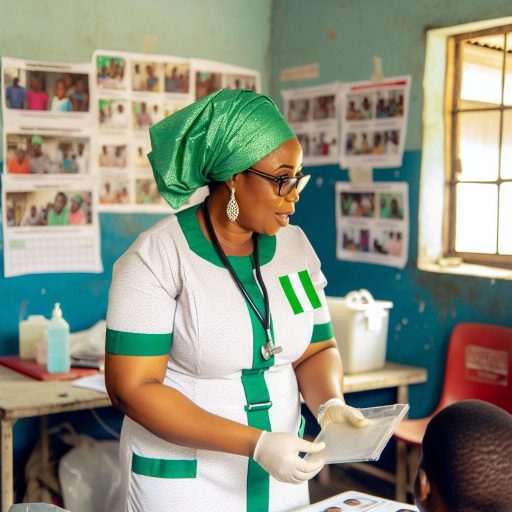Introduction:
Accreditation and licensing are vital for dietitians in Nigeria.
They help demonstrate competency and accountability in the field.
The role of these processes is to maintain professional standards.
They ensure quality care for patients through regulated practice.
Importance of Accreditation and Licensing for Dietitians in Nigeria
Accreditation and licensing are crucial for dietitians in Nigeria to demonstrate competency and accountability.
Role of Accreditation and Licensing in Professional Standards
Accreditation ensures that dietitians meet educational and training standards.
Licensing confirms eligibility to practice for dietitians.
Ensuring Quality Care for Patients
Accredited and licensed dietitians provide evidence-based practices.
This ensures optimal care and outcomes for patients.
Overview of current accreditation and licensing processes for dietitians in Nigeria:
- Description of existing regulatory bodies responsible for accrediting and licensing dietitians
- Explanation of the requirements and criteria for accreditation and licensing
- Discussion of the challenges and gaps in the current system
Currently, in Nigeria, the accreditation and licensing of dietitians are overseen by regulatory bodies such as the Nigeria Dietetic Association (NDA). The NDA plays a crucial role in ensuring that dietitians meet the necessary standards to practice in the country.
Description of existing regulatory bodies:
Aside from the NDA, other regulatory bodies involved in accrediting and licensing dietitians include the Medical and Dental Council of Nigeria (MDCN) and the Ministry of Health. These bodies work together to set and enforce guidelines that dietitians must adhere to.
Requirements and criteria for accreditation and licensing:
For dietitians to be accredited and licensed in Nigeria, they must possess a Bachelor’s degree in Human Nutrition, Dietetics, or a related field from a recognized institution. Additionally, they are required to complete a supervised internship program and pass a national examination.
Furthermore, dietitians must participate in continuing education programs to stay updated on the latest research and practices in the field. They are also expected to adhere to a strict code of ethics and conduct to maintain their accreditation and license.
Challenges and gaps in the current system:
Despite the efforts of regulatory bodies, there are still challenges and gaps in the accreditation and licensing process for dietitians in Nigeria. One major challenge is the lack of standardization across different states, leading to inconsistencies in the requirements and criteria for accreditation.
Another issue is the limited number of accredited institutions offering dietetics programs, resulting in a shortage of qualified dietitians in the country. This shortage poses a significant barrier to improving the nutritional status and health outcomes of Nigerians.
Additionally, there is a need for increased public awareness about the importance of seeking services from accredited and licensed dietitians. Many individuals may unknowingly consult unqualified practitioners, jeopardizing their health and well-being.
By improving standardization, expanding educational opportunities, and raising awareness, the country can enhance the quality of nutritional care provided to its citizens.
Benefits of accreditation and licensing for dietitians in Nigeria:
Importance of ensuring the competence and professionalism of dietitians
Accreditation and licensing ensure that dietitians meet educational and professional standards.
It provides assurance to clients and employers that dietitians have the necessary skills.
This helps in building trust and credibility in the dietitian’s ability to provide quality nutrition services.
Impact on improving healthcare quality and patient outcomes
Accredited and licensed dietitians are more likely to follow evidence-based practices.
This leads to better nutrition interventions and improved health outcomes for patients.
It also contributes to the overall quality of healthcare services in Nigeria by setting higher standards.
Opportunities for career advancement and recognition
Accreditation and licensing open doors to job opportunities in various healthcare settings.
It allows dietitians to advance their careers by specializing in different areas of nutrition.
Recognition from being accredited can also lead to increased earning potential and professional growth.
Delve into the Subject: How to Start a Career in Public Health Technology
Comparison with accreditation and licensing processes in other countries:
Nigeria’s accreditation and licensing processes for dietitians are analyzed against international standards.
Best practices from other countries can be implemented to enhance Nigeria’s system.
Potential collaborations with international bodies for accreditation and licensing are discussed.
International Standards:
When comparing Nigeria’s accreditation and licensing processes for dietitians with other countries, it is essential to look at the international standards set by organizations such as the International Confederation of Dietetic Associations (ICDA) and the World Health Organization (WHO).
Best Practices from Other Countries:
Several countries have well-established accreditation and licensing processes for dietitians that Nigeria can learn from.
For example, the United States has the Commission on Dietetic Registration (CDR), which sets rigorous standards for dietitians to ensure quality education and practice.
In the United Kingdom, the British Dietetic Association (BDA) plays a significant role in accrediting dietetic programs and licensing professionals.
Their model includes continuous professional development and supervision to maintain high standards in the field.
By studying these best practices, Nigeria can improve its accreditation and licensing processes to ensure that dietitians meet international standards and provide quality care to patients.
Collaborations and Partnerships:
Collaborating with international bodies can enhance Nigeria’s accreditation and licensing processes for dietitians.
Partnerships with organizations like the ICDA and WHO can provide resources, training, and support to strengthen the system.
By working with these international bodies, Nigeria can access global expertise and best practices to improve the education, training, and regulation of dietitians in the country.
Delve into the Subject: Nutrition and Dietetics Conferences in Nigeria 2025
Transform Your Career with Expert Guidance
Get personalized mentorship consulting that’s tailored to your unique path. Our expert advice is actionable and exclusive.
Get StartedStakeholders Involved in the Accreditation and Licensing Process
Roles and Responsibilities of Regulatory Bodies, Professional Associations, Educational Institutions, and Government Agencies:
- Regulatory bodies ensure compliance with industry standards and regulations.
- Professional associations set guidelines for ethical conduct and professional development.
- Educational institutions provide the necessary training and education for aspiring dietitians.
- Government agencies oversee the overall governance and implementation of accreditation and licensing processes.
Importance of Collaboration and Communication Among Stakeholders to Ensure the Effectiveness of the Accreditation and Licensing Process:
- Collaboration ensures a unified approach towards maintaining high standards in the profession.
- Communication allows for the sharing of best practices and addressing any challenges that may arise.
- Coordination among stakeholders helps in streamlining the accreditation and licensing process.
- Efficient communication fosters transparency and trust among all parties involved.
Advocacy for the Involvement of Dietitians Themselves in Shaping Accreditation and Licensing Policies:
- Dietitians bring firsthand experience and expertise to the policymaking process.
- Their input can help tailor accreditation and licensing requirements to the needs of the profession.
- Involving dietitians ensures that policies are practical, relevant, and beneficial for practitioners.
- Dietitians can advocate for changes that reflect the evolving landscape of nutrition and dietetics.
Find Out More: Networking Opportunities for Physiology Students

Challenges and Barriers to Accreditation and Licensing for Dietitians in Nigeria:
When it comes to accreditation and licensing for dietitians in Nigeria, there are several challenges and barriers that hinder the process.
Lack of resources and infrastructure for accreditation and licensing:
- Inadequate funding for regulatory bodies to carry out accreditation processes.
- Lack of proper facilities and technology to assess and monitor dietitians.
- Insufficient manpower to oversee the accreditation and licensing process.
Inconsistencies in education and training programs for dietitians:
- Variations in curriculum content and quality among different educational institutions.
- Lack of standardized training programs for aspiring dietitians.
- Shortage of qualified instructors and preceptors in dietitian training programs.
Resistance to change and reluctance to adopt accreditation and licensing standards:
- Traditional beliefs and practices that undermine the importance of accreditation.
- Lack of awareness about the benefits of being accredited and licensed.
- Fear of increased scrutiny and accountability that comes with accreditation and licensing.
Addressing these challenges and barriers is crucial for improving the accreditation and licensing system for dietitians in Nigeria.
By allocating more resources, standardizing education programs, and promoting the benefits of accreditation, the dietitian profession in Nigeria can achieve higher standards and ensure better quality of care for patients.
Explore Further: Medical Biochemistry Curriculum in Nigerian Schools
Recommendations for improving accreditation and licensing for dietitians in Nigeria:
Accreditation and licensing for dietitians in Nigeria are crucial steps towards ensuring quality and competence in the field of nutrition and dietetics.
To further enhance this process, several recommendations can be considered.
Strengthening regulatory frameworks and enforcement mechanisms:
One way to improve accreditation and licensing for dietitians in Nigeria is to strengthen the regulatory frameworks governing the profession.
This can include setting clear standards for education, training, and practice.
Strict enforcement mechanisms are also necessary to hold practitioners accountable.
Enhancing education and training opportunities for dietitians:
Another important recommendation is to enhance education and training opportunities for dietitians in Nigeria.
This can be achieved through establishing more accredited nutrition and dietetics programs.
Providing continuous professional development opportunities for practicing dietitians is also essential.
Promoting awareness and advocacy for the importance of accreditation and licensing:
It is crucial to promote awareness among the general public about the significance of accreditation and licensing for dietitians.
This can be done through targeted advocacy campaigns, media outreach, and educational programs.
Highlighting the role of accredited professionals is essential in ensuring public health and safety.
By implementing these recommendations, Nigeria can further strengthen its accreditation and licensing processes for dietitians.
This will ensure that only qualified and competent professionals are allowed to practice in the field of nutrition and dietetics.
Importance of Accreditation and Licensing for Dietitians
Accreditation and licensing for dietitians in Nigeria are crucial for ensuring quality healthcare services.
We have discussed the current challenges faced in this process and the need for improvement.
It is vital for stakeholders to collaborate and work towards enhancing accreditation standards for dietitians in the country.
By upholding professional standards and licensing requirements, we can guarantee the delivery of high-quality care to patients.
Let us join hands and strive towards a better system that promotes excellence in dietetic practice in Nigeria.
Together, we can make a difference and ensure that dietitians meet the necessary qualifications and standards to provide optimal care.
The future of healthcare in Nigeria depends on the commitment of all stakeholders to improving accreditation and licensing for dietitians.
Additional Resources
Masters in Physician Assistant – Rutgers School of Health Professions




